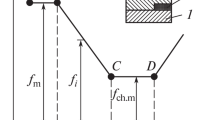Abstract
When using lubricants in binding machines, the isolation properties of the used lubricants are essential for a failsafe operation of the spot-welding process. Lubricants are applied to the sliding plates to ensure low-friction infeed of the spot-welding arm. In case of over-lubrication, a current transfer results in a reduced functionality of the spot-welding process. Therefore, the isolation properties of the used lubricants have to be considered. The measurement of the isolation resistance and the dielectric strength is suggested for the selection of a proper lubricant. Within this contribution, the isolation properties of thin lubricant film contacts were systematically investigated by measurement of the isolation resistance and dielectric strength. The influence of temperature and humidity present in the insulation fluids and the dependency of the measurement voltage and electrode distance are discussed. The benchmark of a selection of different lubricants clearly indicated the importance of choosing the right lubricant for the specific application.
Zusammenfassung
Beim Einsatz von Schmierstoffen in Bindemaschinen sind die Isoliereigenschaften der jeweiligen Schmierstoffe für einen störungsfreien Betrieb des Punktschweißprozesses entscheidend. Schmierstoffe werden an den Gleitplatten aufgetragen, um eine reibungsarme Zustellung des Punktschweißarmes zu gewährleisten. Allerdings kommt es bei Überschmierung durch die Stromübertragung zu einer reduzierten Funktionalität des Punktschweißprozesses. Aus diesem Grund sind die Isolationseigenschaften der verwendeten Schmierstoffe im Besonderen zu berücksichtigen, und die Messung des Isolationswiderstandes und der Durchschlagsfestigkeit ist für die Auswahl eines geeigneten Schmierstoffes empfohlen. Im Rahmen dieser Studie wurden die Isolationseigenschaften von dünnen Schmierfilmkontakten durch Messung des Isolationswiderstandes und der Durchschlagsfestigkeit systematisch untersucht. Dabei wird der Einfluss von Temperatur und Feuchtigkeit in den Isolierflüssigkeiten und die Abhängigkeit von der Messspannung und dem Elektrodenabstand diskutiert. Der Vergleich einer Auswahl verschiedener Hydrauliköle zeigte deutlich, wie wichtig die Wahl des geeigneten Schmierstoffs für die jeweilige Anwendung ist.









Similar content being viewed by others
References
Bechev, D., Capan, R., Gonda, A., Sauer, B.: Method for the investigation of the EDM breakdown voltage of grease and oil on rolling bearings. Bear. World J. 4, 83–91 (2019)
Joshi, A., Blennow, J.: Electrical characterization of bearing lubricants. In: 2014 IEEE Conference on Electrical Insulation and Dielectric Phenomena (CEIDP), pp. 586–589. (2014)
Ghani, S.A., Muhamad, N.A., Chairul, I.S., Jamri, N.: A study of moisture effects on the breakdown voltage and spectral characteristics of mineral and palm oil-based insulation oils. ARPN J. Eng. Appl. Sci. 11(8), 5012–5020 (2016)
Beroual, A., Khaled, U., Noah, P.S.M., Sitorus, H.: Comparative study of breakdown voltage of mineral, synthetic and natural oils and based mineral oil mixtures under AC and DC voltages. Energies 10(4), 511 (2017)
Dang, V.-H., Beroual, A., Perrier, C.: Comparative study of statistical breakdown in mineral, synthetic and natural ester oils under AC voltage. IEEE Trans. Dielectr. Electr. Insul. 19(5), 1508–1513 (2012)
Fontes, D.H., Ribatski, G., Filho, E.P.B.: Experimental evaluation of thermal conductivity, viscosity and breakdown voltage AC of nanofluids of carbon nanotubes and diamond in transformer oil. Diam. Relat. Mater. 58, 115–121 (2015)
Jin, H., Andritsch, T., Morshuis, P., Smit, J.: AC breakdown voltage and viscosity of mineral oil based SiO2 nanofluids. In: Annual Report Conference on 2012 Electrical Insulation and Dielectric Phenomena (CEIDP), pp. 902–905. (2012)
Suleiman, A.A., Muhamad, N.A., Bashir, N., Murad, N.S., Arief, Y.Z., Phung, B.T.: Effect of moisture on breakdown voltage and structure of palm based insulation oils. IEEE Trans. Dielectr. Electr. Insul. 21(5), 2119–2126 (2014)
Wang, X., Wang, Z.D.: Particle effect on breakdown voltage of mineral and ester based transformer oils. In: 2008 Annual Report Conference on Electrical Insulation and Dielectric Phenomena, pp. 598–602. (2008)
Sander, K.: Kalibrieren von Feuchtesensoren (2013). https://www.s-elabor.de/k00002.html, Accessed 12 Dec 2021
Noria Corporation: Base oil groups explained (2012). https://www.machinerylubrication.com/Read/29113/base-oil-groups, Accessed 11 Jan 2022
Acknowledgements
This work was funded by the “Austrian COMET-Program” (project InTribology1, no. 872176) via the Austrian Research Promotion Agency (FFG) and the federal states of Niederösterreich and Vorarlberg and was carried out within the “Excellence Centre of Tribology” (AC2T research GmbH).
Author information
Authors and Affiliations
Corresponding author
Additional information
Publisher’s Note
Springer Nature remains neutral with regard to jurisdictional claims in published maps and institutional affiliations.
Rights and permissions
About this article
Cite this article
Schneidhofer, C., Bujor, B., Adler, M. et al. Influence of Lubricant Properties on the Electrical Isolation in Binding Machines. Berg Huettenmaenn Monatsh 167, 229–235 (2022). https://doi.org/10.1007/s00501-022-01227-1
Received:
Accepted:
Published:
Issue Date:
DOI: https://doi.org/10.1007/s00501-022-01227-1
Keywords
- Isolation resistance
- Reduction of welding functionality
- Dielectric strength
- Extraneous electrical currents
- Hydraulic fluids




